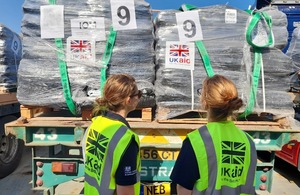UK aid en route to temporary pier off Gaza
More than 100 tonnes of aid is on its way to maritime pier off the coast of Gaza.

British workers with UK coverage kits at Larnaca port.
- UK aid has left Cyprus today for first delivery to new temporary pier off Gaza
- initial contribution will total nearly 100 tonnes of shelter coverage kits
- maritime route will complement efforts to deliver aid by land, which remains critical
UK aid has left Cyprus and will be part of the first delivery to the temporary pier on the Gaza coast.
Nearly 100 tonnes of UK aid comprising 8,400 shelter coverage kits – temporary shelters made up of plastic sheeting – are the first part of a £2 million package of UK aid to be delivered from Cyprus. The aid will be distributed within Gaza as soon as feasible.
The pier, which has been built by the US Navy and Army, will initially facilitate the delivery of an estimated 90 truckloads of international aid into Gaza each day, and scale to up to 150 truckloads a day once fully operational.
Prime Minister Rishi Sunak said:
The UK has been working around the clock with our allies and partners to ensure more aid gets into Gaza via all possible routes - land, air and sea. We are leading international efforts with the US and Cyprus to establish a maritime aid corridor. Today’s first shipment of British aid from Cyprus to the temporary pier off Gaza is an important moment in increasing this flow.
But we know that more is required, particularly via land, which is why alongside intensive work to get hostages out of Gaza we will continue efforts to unlock more routes to get vital aid in – helping people in desperate need.
Foreign Secretary Lord Cameron said:
It’s essential that we get vital aid to the people of Gaza by all possible routes. We’re working with the US, Cyprus and other allies and partners to do just that and I’m proud that the UK will be part of the first delivery of aid to the new pier.
This pier will play a vital role in getting aid to those who need it in Gaza, but it must be accompanied by an increase in aid delivered through land routes. Israel’s commitments to increase access are welcome but we need to see more aid making it over the borders and further action – fully opening Ashdod port for aid deliveries; more land crossings, open for longer; and better deconfliction measures. Only with these in place can we alleviate the humanitarian crisis in Gaza.
The UK has been central to the international effort to establish a maritime aid corridor. It is committing £9.7 million to provide aid, including the initial 8,400 coverage kits, as well as 5 forklift trucks, 900 family tents, a further 2,000 coverage kits, 9,200 hygiene kits, and help with coordinating logistics in Cyprus. The Ministry of Defence is also providing accommodation on board RFA Cardigan Bay for US military personnel constructing the pier.
The opening of the maritime corridor is not a replacement for aid being delivered through land routes, which remain the quickest and most effective way of getting much-needed aid into Gaza.
We continue to urge Israel to meet its commitment to allow at least 500 aid trucks to cross into Gaza through land crossings and open as many routes as possible, including Ashdod. As a fully functioning port, Ashdod’s capacity to receive aid is much larger than will ever be feasible through the maritime pier.
The UK is also doing everything possible to get more aid into Gaza by land and air. We trebled our humanitarian funding to the Occupied Palestinian Territories last financial year, delivering more than £100 million of vital medical, shelter, nutrition and water/sanitation support.
To date the British Royal Air Force has airdropped more than 100 tonnes of life-saving aid, including ready-to-eat meals, water, rice and flour directly into Gaza.
Media enquiries
Email newsdesk@fcdo.gov.uk
Telephone 020 7008 3100
Email the FCDO Newsdesk (monitored 24 hours a day) in the first instance, and we will respond as soon as possible.